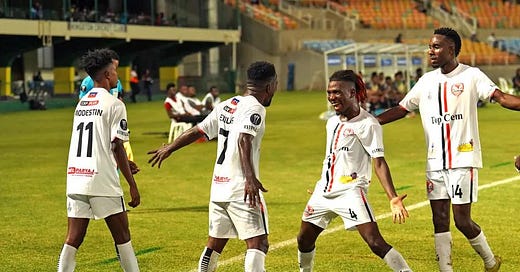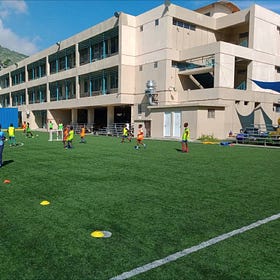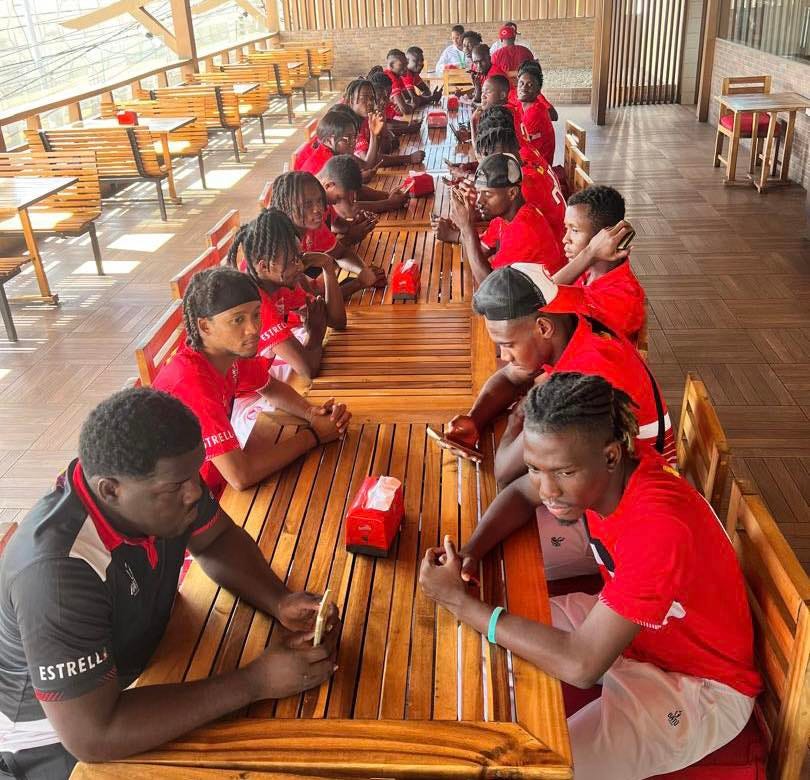🇭🇹 How Haiti's Concacaf Champions Cup entrant Real Hope provides ... just that
Against Cruz Azul, the Cap-Haitien club hopes to showcase Haitian talent to the world
Humans always are searching for a deeper meaning. We connect threads that may or may not be meant to be connected, looking to make sense of an often nonsensical world. Gener Pierre does not have time for this. The owner of Real Hope, which opens the Concacaf Champions Cup on Tuesday against Mexican grande Cruz Azul, Pierre is straight-forward.
The president of the club, the physical trainer and someone doing plenty more behind the scenes, Pierre notes that sometimes things are as simple as they seem. The name of the club he founded in 2014 is one of them.
“Real Hope Football Academy is exactly what the name says it is. It’s a football academy based out of Cap-Haitien, Haiti. The logic behind it is right in the name: Real Hope!” Pierre told me this week. “Haiti is going through such a terrible time in its history.
“Being there, and being a football person, I thought this was the perfect way to do something positive in the community and give young athletes with God-given talent an opportunity where they can dream big.”
But, Pierre concedes, things also happen behind the scenes, out of public view that do require much more explanation - explanation he’s happy to take the time to help outsiders understand.
“What’s simple for everybody else is a huge deal for us,” he said.
There has been difficulty raising funds, finding venues, securing visas, and so, so much time away from home. Pierre hopes the fact that his team has set up a home base in the Dominican Republic, where the team must host matches since the political situation and violence in Haiti make it impossible for Concacaf to sanction matches there, shows his team is far from a charity case.
After all, they earned their way here, with a pair of victories over Dominican club Moca in the Caribbean Cup third-place playoff earning the region’s final place in the competition.
The reward, a two-legged First Round series with one of the region’s most successful clubs, almost feels harsh. Yet, Real Hope are thrilled to be taking part in the competition at all.
Their home city of Cap-Haitien, in Haiti’s north, has been fortunate to avoid much of the societal collapse and daily gang violence currently plaguing Port-au-Prince. The chaos in the capital 125 miles south still causes huge problems for all of Haiti, though, since it’s at the center of the country’s supply chain.
🇭🇹 Can soccer save Haiti? James Louis-Charles believes so
James Louis-Charles sighs and navigates his car toward another checkpoint. His path to the school where he teaches is obstructed by men. Those men are wearing masks. Those men are toting guns. What used to be a 10- or 15-minute commute sometimes involves as many as four checkpoints. That the sight is familiar and that this is now part of his routine doe…
“Without Port-au-Prince, you don’t really get no food. You don’t really get no fuel, you don’t really get no water, no soda. Everything comes out of Port-au-Prince,” Pierre said. “It’s difficult as it is already, but it just makes the situation way worse.”
When so many people are wondering when or where their next meal will come from, instituting a nutrition program like teams from Liga MX or MLS put players on is out of the question. Securing sponsorships, in the absence of local business, is another nearly insurmountable hurdle.
Still, teams from the north, like Real Hope, and from the south were able to organize a domestic league that permitted Haitian clubs to return to Concacaf tournaments. Real Hope topped Ouanaminthe in a penalty shootout to win the league and earn a place in the Caribbean Cup.
Once into the regional competition, Real Hope was able to mount a remarkable run to third place. It wouldn’t have happened without some goodwill from the soccer community.
Hosting their opening matches of the Caribbean Cup in Jamaica, the Jamaica Football Federation allowed Real Hope to stay in its residential facilities rather than pay for a hotel. The JFF also had a contact in the Ministry of Interior help secure visa waivers since Jamaica has no active embassy in Haiti. Because of the political situation, Haitians also generally can’t get visas to the Dominican Republic. Pierre credited Cibao FC, whose stadium will host this month’s match, for an assist in getting the proper documents.
Past Haitian entrants in the CCC have been unable to compete because of visa issues (Cavaly AS in 2022) or have had to make a number of last-minute signings of players already in the U.S. (Violette, which knocked out Austin FC in 2023).
Crucially, Pierre said, his entire squad has visas that will allow them to enter both Mexico, where they’ll play Feb. 11, and the U.S. where they could play against the Seattle Sounders in the next round were they to pull off the greatest upset in CCC history, for the next six months.
That’s important not only for the current competition but also for players’ chances of playing professional soccer outside the Caribbean. Pierre said three players are on the national team radar but couldn’t travel to join up with the squad. Other players have been on the radar of foreign clubs but couldn’t make a trip for a trial.
Jerome Salbert, an agent based in France , sees huge potential in Haitian soccer and already has signed several Real Hope players to his Global Sport International agency even before they step into the bright spotlight of the CCC. Yet, he says, the issue of getting the players proper documents remains a major obstacle for players from Haiti compared to those from many neighboring countries.
“These very talented players dream to play in the best leagues in the Concacaf and UEFA regions, but they are facing challenges to get visas to travel overseas,” Salbert said. “The Haitian passport is recognized in only 49 countries - and only two in all of the Americas, Belize and Bolivia. Everywhere else, a visa is required to travel, even as a tourist.”
While plenty of players in Haiti have the technical skills and the motivation to triumph abroad, Salbert said, teams would never send scouts to Haiti because of the security situation, meaning international tournaments are one of the only ways for players to get onto the radar.
Even with those difficulties, and with time away from families as they’ve scheduled preparation friendly matches against Dominican teams for the last several weeks, Real Hope’s players and staff are eager for the opportunity the CCC affords them.
“We don’t mind. Trust me, we are a very joyful group. We’re extremely happy to be here,” Pierre said. “But we don’t plan on just being here to participate. We want to compete. We’re going to put all in the necessary effort to compete. We think we can. We know we’re not on the level of Cruz Azul. We don’t have the type of players Cruz Azul has, but I think we have some factors in our favor.
“Haitian soccer as a whole is underestimated, just because the structure is so bad, so the talent never has an opportunity to flourish. I don’t think the Caribbean or Concacaf has actually seen a solid Haitian team. There are diamonds in the rough.”
In a country obsessed with the Brazil and Argentina national teams, and one lacking many players with the physical stature of some of their Caribbean rivals, Pierre said Haitian clubs can put a different style of play on the pitch, one based on possession and technical skill.
After allowing himself to dream for a moment, he returns to his realistic demeanor. Getting past Cruz Azul is all but impossible. It’s simple. The Mexican giant will win, with Real Hope squeezing everything it can out of the two weeks it’s in the international tournament.
Sometimes, though, even a man like him can admit that things may not be so straight-forward, sometimes things fall into place in delightful and surprising ways. Sometimes it’s worth having hope, or working to give hope to other people.
“We hope some change comes to Haiti,” he said. “There’s a lot of talent going to waste in the country.”










Excellent piece on the kind of club that would often get no more than a mention
How is Real Hope pronounced? Is it the words in English? Spanish then English? French?